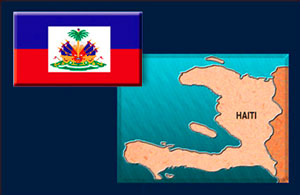FCNNEWSSOURCE
A One-on-One Interview with Haitian activist Noluthando Williams

When the report “The Emergence of HIV/AIDS in the Americas and Beyond” was released in the online edition of the Proceedings of the National Academy of Sciences on Oct. 30, claiming that the AIDS virus entered the United States through the island-nation Haiti, Los Angeles-based Haitian activist Noluthando Williams declared that they unleashed an array of deadly lies and deadly distractions.
The report, authored by M. Thomas P. Gilbert, Andrew Rambaut, Gabriela Wlasiuk, Thomas J. Spira, Arthur E. Pitchenik, and Michael Worobey, highlights their study of 25-year-old blood samples, which they purport tracks the virus’ trek out of Africa, through Haiti, and into America in or around 1969.
Ms. Williams, a member of the Pan African Activist Coalition and the Coalition in Solidarity With Haiti, expressed her thoughts about the motive and impact of the report with Final Call Staff Writer Charlene Muhammad on the day of its release.
THE FINAL CALL (FC): What was your first reaction to this report?

Noluthando Williams (NW): First, the only thing that I find to be correct about the report is that AIDS surfaced in the U.S. in the 1960s. The truth is not that Haiti was a route for HIV and AIDS to enter into the U.S.–the truth is it is still in 2007, going into 2008, a high priority for the U.S. military, as well as the nations that they’re in alliance with, to keep Haiti politically subjugated, because Haiti is still too important to freedom-seeking people throughout the world.
[Haiti] is still the hero of freedom; the nation that we all look up to. They know that there are still enough of us who know the truth that they’re trying to make us look down on Haiti, but never. I believe that this is just an extension of a larger campaign to completely squash the People’s Movement in Haiti. In 1804, [Haiti] was able to take down all of the major superpowers, Napoleon’s France–deemed the greatest of the time–and Great Britain’s Navy, which was supported by the U.S. and Canada. The U.S. never wanted to get to that place again; hence, we have this report.
FC: The Haitian people’s strength and determination have remained in tact despite the U.S.-backed overthrow of President Jean-Bertrand Aristide, his subsequent exile, and current UN occupation, to cite a few challenges. What else do you believe could be beneath the surface of this report in terms of the people’s spirit? We do know that the will to fight remains within the Haitian people, but under the UN occupation, is a physical battle a real threat to the West currently?
NW: For those who will come in contact with Haitians abroad, this report is propaganda. We’re supposed to feel that they should be locked up in detention camps. They are planning to destabilize the country. There has been progress, but only because of the determination, creativity and fierce refusal of the grassroots movement to bow down. The U.S. embassy is the most important entity in Haiti, unfortunately, not any Haitian institution. Even though they already had a new building, they just built an elaborate one, because Haiti is so strategically placed in terms of Venezuela and Cuba. The U.S. wants to make sure Haiti is in no way beneficial to those strong points as well.
FC: Can you enlighten us, from your last visit to Haiti, on the condition of the people who are suffering from the pandemic?
NW: First, if you look at HIV and AIDS and primary transmission, poor people do not necessarily have more sex than wealthy people, or savage kind of sex. But poor people are considered expendable by multiple parties–by people who have political motivations; people who want to be involved in genocide campaigns; or mad scientists who are callous and careless. That’s happened before and that’s why there is a higher rate of HIV and AIDS.
I’ve been in Haiti and I just wasn’t seeing people with high rates of HIV and AIDS, but they’re making it seem like, “Oh my God! Whole villages are shut in with AIDS.” I’m not saying that it is not an epidemic or not impacting people; I’m saying that just as they are using kidnappings as a tactic of war in Haiti, they are using chemical and biological warfare. They will put out the propaganda and then insert the chemical weaponry to bring it to fruition. African people are targeted more than any other people of color.
FC: Typically, this type of claim spawns protests in various forms, including demonstrations. How would you urge those angered by these authors’ assertions to adequately address this?
NW: It’s really important for Black people to strengthen our underground and have our own counter-intelligence tighter. In Haiti, this is why Western powers have not been able to grow stronger, but we’re losing that because we spend a lot of time behind computers. We could be in dialogue with someone for months and not see them. We need to be a lot more spiritually in tune because our spiritually as Africans will really be our defense.
They’d love to get us distracted on this, because then we’d stop fighting for temporary protective status. Though it is progressing, Haiti is still unstable. There’s still political murders; thousands of political prisoners unjustly imprisoned; people who need to get out of the country, but will be thrown into U.S. prisons if they come without papers, which are really difficult to get.
We must not get distracted. When I go to Haiti and speak with Sisters who have had their husbands jailed, their homes burned, their children raped or killed, the Sisters declare that they will continue to have their husbands jailed, their homes burned [and] their children raped or killed until they have their freedom and the People’s Party is put back into power, so their country can move forward.
FC: Thank You.












